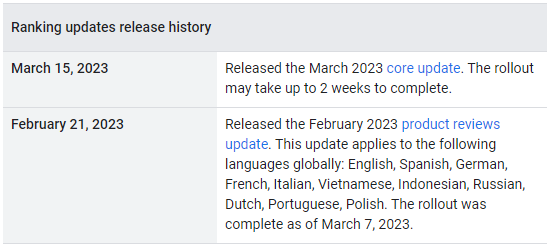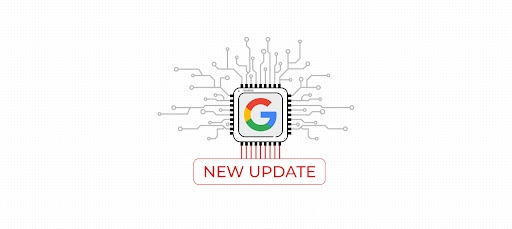Google has recently announced a significant broad core algorithm update for March 2023. The update is expected to have a significant impact on search engine rankings, and website owners and SEO professionals need to be aware of the changes.
Jump to: Latest Google documentation updates January – March 2023 | Google documentation updates March 2023 | Google documentation updates February 2023 | Google documentation updates January 2023 | Google documentation updates – General Updates 2023 | The quality and relevance of search results | What to Do in Case of a Google Core Update

Latest Google documentation updates January – March 2023
Google made several updates in February and March 2023 to its search engine algorithms and search documentation, which site owners and SEOs should be aware of.
Google frequently updates its documentation to provide accurate and up-to-date information for website owners and SEO professionals. In the past few months, several updates have been made to the documentation, ranging from minor changes to major updates. In this article, we will go over each modification, chapter by chapter, to understand what changes have been made.
Google documentation updates March 2023
Updates Google made several updates in March 2023, including an updated User Agent string for AdsBot Mobile Web Android. Website owners who hardcoded the old value in their code will need to update the string to avoid potential bugs. Additionally, Google added an overview page for the Google SEO Office Hours and published a transcript of the March 2023 Google SEO Office Hours. Moreover, South Korea was removed from the available regions for the job search experience on Google.
However, it doesn’t mention that the documentation for the following has been updated and modified:
-
- How to migrate a site
- The documentation for metadata on images in Google Images
- On March 13th, the documentation for Review Snippets and URL encoding was modified
- The documentation for verifying Googlebot and other Google crawlers has also been modified.
Google documentation updates February 2023
Updates In February 2023, Google made several updates to its documentation. For instance, the hosting location requirement was removed from the favicon documentation. Website owners no longer need to host the favicon in the same domain to be eligible for a favicon in Google Search results. Additionally, Google clarified that Discover uses many of the same signals as Search in both the Discover documentation and the helpful content system page. Furthermore, new best practices for links were added.
Google documentation updates January 2023
Updates In January 2023, Google made several updates to its documentation. For example, the search engine giant added a new case study about how Vimeo improved video SEO at scale for their customers by using the indexifembedded rule combined with noindex and adding structured data. Additionally, Google updated the Images best practices to clarify that Google parses < img > elements, even when they’re enclosed in other elements such as < picture > elements, when indexing images. Moreover, Google removed the 110 character limit for the headline property in the Article structured data documentation.
Google documentation updates – General Updates 2023
In addition to the specific updates mentioned above, Google made several general updates to its documentation. For example, the search engine giant added a new section for authors on the Google Search Central Blog. Moreover, Google simplified the wording in the Policy circumvention section of its spam policies based on user feedback.
Additionally, Google revamped its documentation about sitemaps based on user feedback. Notably, duplication between the sitemaps protocol and Google’s documentation was reduced, more examples were added to Google’s documentation about sitemap extensions, and a new document was added about how to combine sitemap extensions. Furthermore, Google refreshed its documentation about canonicalization, splitting the original documentation into three distinct sections: what is URL canonicalization, how to specify a canonical with rel=”canonical” and other methods, and how to fix canonicalization issues.
The quality and relevance of search results
According to Google, the update is designed to improve the quality and relevance of search results, providing users with more accurate and helpful information. The update focuses on several key areas, including content quality, user experience, and site performance.
- One of the primary focuses of the update is content quality. Google has been emphasizing the importance of high-quality, original content for several years now, and this update is no exception. Websites that provide valuable, well-researched, and expertly written content are likely to see a boost in their search engine rankings, while those that rely on thin or duplicated content may see a decline.
- Another critical area of focus is user experience. Google has long recognized the importance of user experience in search engine rankings, and this update takes that to a new level. Websites that prioritize user experience, such as fast loading times, mobile-friendliness, and easy navigation, are likely to see a boost in their rankings.
- Finally, site performance is also a significant factor in this update. Websites that load quickly and have minimal technical issues are likely to see a boost, while those with slow loading times, broken links, and other technical problems may see a decline in their rankings.
Overall, these updates demonstrate the importance of staying up-to-date with Google’s search documentation to ensure that your website is optimized for the best possible search engine performance.
What to Do in Case of a Google Core Update
- First, it’s important to understand that a core update is a broad change to Google’s algorithm, and therefore, it may affect many websites across various niches. It’s not a penalty, but rather a shift in how Google evaluates and ranks content.
- To mitigate the impact of a core update, website owners should focus on creating high-quality content that provides value to users. This includes ensuring that the content is relevant, accurate, and up-to-date. Website owners should also prioritize user experience, making sure that their website is easy to navigate, loads quickly, and is mobile-friendly.
- It’s also important to analyze the website’s analytics data to identify any drops or increases in traffic following the core update. This can help website owners pinpoint which pages or sections of their website may have been impacted and adjust their strategy accordingly.
- Website owners can also seek out expert advice from reputable sources, such as Google’s official documentation and community forums. This can provide additional insights and guidance on how to improve the website’s rankings.
- Finally, it’s important to maintain a long-term perspective and focus on creating a sustainable strategy for improving search rankings, rather than relying on quick fixes or short-term tactics that may not be effective in the long run.
Overall, the March 2023 core algorithm update is expected to have a significant impact on search engine rankings. Website owners and SEO professionals need to be aware of the changes and take steps to ensure that their sites are optimized for the new ranking factors. By focusing on content quality, user experience, and site performance, website owners can improve their chances of ranking highly in the search engine results pages and attracting more traffic to their sites.

